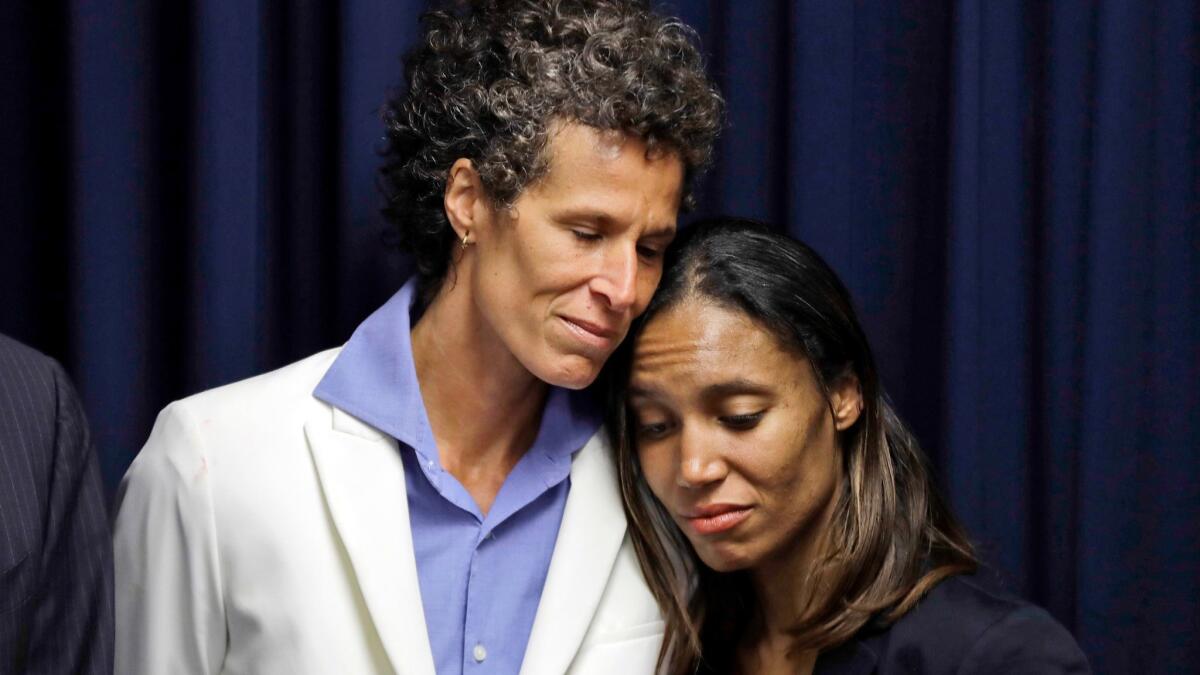Newsletter: Bill Cosby’s sexual assault conviction matters — a lot

- Share via
Good morning. I’m Paul Thornton, and it is Saturday, April 28, 2018. Let’s take a look back at the week in Opinion.
How many of Bill Cosby’s few dozen accusers can you name? If you’re anything like me, probably between zero and three — and yet Cosby, through his lawyers, argued in court that the women who accused him of drugging and assaulting them years ago lied about their experiences with him out of a desire to gain fame.
The jury in Cosby’s second sexual assault trial was convinced — not by his lawyers, but by the prosecutors who argued that Andrea Constand deserved to be believed when she accused the once-celebrated actor, comedian and activist of drugging and assaulting her. This is a very big deal, says The Times Editorial Board:
As in so many cases for so many years, this one turned on the credibility of the accuser. Was Andrea Constand a liar and a "con artist," as the defense maintained, when she said that Cosby drugged and assaulted her? Was she a deceitful fortune-seeker who thought she'd found an easy mark?
The jury said no.
The jury was charged, of course, with determining the truth or falsity only of Constand's accusations, on the basis of the evidence presented in court. Cosby was not being tried for all the other accusations against him by the more than 50 other women who have come forward with similar stories of pre-meditated rape and sexual assault. (Many of the others alleged assaults happened decades ago, and the statute of limitations for bringing charges has expired.)
But in the court of public opinion, at least, this was not just about Cosby versus Constand. It was about all the creepily similar accusations, about all the women who said they were violated by this man. To those of us who were not in the courtroom, Constand was a proxy for those women, and in some ways, for all women....
It's depressing how many women have felt powerless for so long to confront sexual abuse, harassment and discrimination. But it's heartening to know that this time, a woman was able to tell her story and persuade a jury even in the face of a vicious counter-narrative by a powerful man.
What Cosby’s accusers endured to secure his conviction: Constand, writes journalist Maria Bustillos, had every detail of her assault picked over and questioned in a courtroom — twice. Actress Lachele Covington, Cosby’s first accuser, was treated abominably in 2000. Countless women, young girls and more watched as people brave enough to come forward and take on a powerful man were called liars, con artists and worse. “Look what happens when you tell the truth and are brave, you don't have to fail or be humiliated,” Bustillos says we can now tell our children. “You can seek justice, and you can win it.” L.A. Times
Affluent New York man flies to Los Angeles, is stunned by inequality — that’s the alternative, stripped-down way to describe Ross Douthat’s attempt to causally link the growing inequality in California’s major urban areas to the Democratic Party’s total control of Sacramento. Contrary to the dominant narrative that changing demographics in California have driven the Democrats’ success, Douthat sees the departure of middle-class conservatives to adjacent red states as another significant reason for the Golden State GOP’s dim reality — and, bizarrely, as metastasizing “made-in-California” Trumpism nationally. Because Peter Thiel’s from here. New York Times
Scott Pruitt, of all people, professes a love of transparency. The head of the Environmental Protection Agency should lose his job for all the usual reasons — the unnecessary first-class airline travel, his exorbitantly expensive security detail, the $50-per night condo he rented from the wife of an energy lobbyist, his installation of a $43,000 sound-proof booth in his office. More damaging than any of this, says The Times Editorial Board, is his intent on dismantling federal protections for the environment, as evidenced this week by his decision for forbid the EPA’s use of studies whose underlying data are not fully public. L.A. Times
A memorial to lynching victims — coming soon near you. That’s one goal of the National Memorial for Peace and Justice, where a column hangs with victims’ names inscribed for each of the 800-plus counties in which lynchings have taken place. Those columns can be taken to the respective counties for public display, reminding those who reside there of the terror and prevalence of the extrajucidial executions that took the lives of 4,400 people. L.A. Times
Starbucks is not a safe space for black people. The thousands of stores that make up the coffee-house empire serve as a powerful symbol of the luxury of leisure, the presence of which in a neighborhood signals that it has “arrived.” That’s why, after the riots of 1992, South Los Angeles activists and leaders put Starbucks high on their wish list of businesses that should replace burned-out liquor stores and other blighted commercial spaces. Now, writes Erin Aubry Kaplan, the arrest of two black men at a Philadelphia Starbucks drives home the reality that for African Americans, there are no truly neutral public spaces. L.A. Times
Reach me: [email protected]